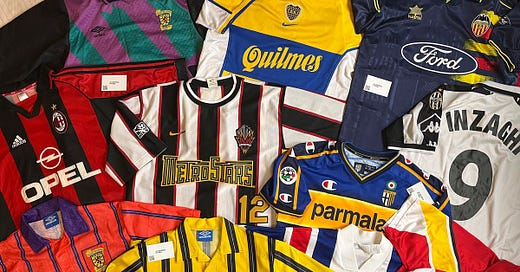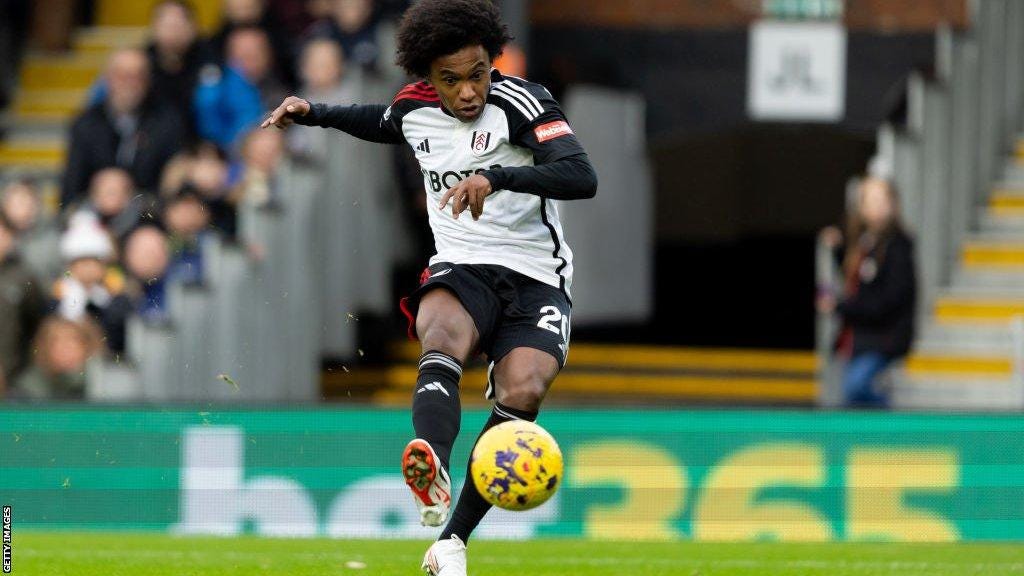From Electronics to Gambling: How Premier League Sponsorships Reveal Football’s Corporate Decay
I saw this on Twitter, and my economics degree—usually locked away in the deep recesses of my brain, only resurfacing when I’m forced to calculate how much I’ve spent on takeaway this month—started screaming to be let out. So, here we are. Enjoy the inspiration for this week’s piece, courtesy of capitalism doing what it does best: ruining everything, including football shirts.
Football Sponsorships Used to Represent Industry. Now They Represent Speculation.
A viral tweet comparing Premier League sponsorships in 1992/93 vs. 2024/25 sums up the modern economy better than any textbook ever could.
In 1992, club sponsors were largely car manufacturers, electronics companies, sportswear giants, even pharmaceuticals—industries that produced tangible goods and services.
In 2025, the biggest names on shirts are gambling firms, financial services, and tourism companies, businesses that thrive on risk, speculation, and endless transactions.
The shift is glaring. The companies that once backed football were building things—cars, technology, sports gear. Today, they move money around in ways that often feel more extractive than productive.
Football sponsorships don’t just tell us who has the most money to spend on advertising. They tell us where power sits in the economy.
The Journey from Peugeot to Gambling Sites
Looking at the 1992 sponsor wheel, there’s almost something wholesome about it.
Jaguar, Rover, Peugeot were among the brands attached to clubs.
Sharp, Brother, and NEC—electronics companies—were investing in the sport.
Even a pharmaceutical company had a place in the mix, which is ironic given how much stress-induced medication football fans probably need.
Fast forward to 2025, and the biggest sponsors are betting platforms, crypto gambling firms, and financial services companies that charge you a fee just for breathing near your overdraft.
The industries backing football have shifted from those that create wealth through production to those that generate profit through speculation.
Manufacturing? Shrinking.
Technology? Still there, but mostly tied to financial services.
Gambling and finance? Absolutely booming.
This isn’t just showing a change in sponsorships; it reflects a wider economic reality. The global economy has edged away from industries that build and towards industries that profit from transactions, risk, and attention.
Football’s Gambling Problem Isn’t Just About Sponsors
At this point, betting companies are more visible in football than referees.
Almost half the league is now backed by a gambling firm.
Gambling ads are unavoidable—on kits, on stadium billboards, even in pre-match coverage.
The sport is increasingly structured to encourage real-time betting, keeping fans locked into wagers as much as the game itself.
Football’s relationship with gambling has gone from occasional sponsorship deals to something that feels fundamental to how the sport is sold.
Even clubs that don’t have betting sponsors aren’t exactly innocent. Odds are flashed on TV screens mid-game, ex-players front gambling ads, and entire fan experiences are now built around betting.
The game is no longer just about what happens on the pitch. It’s about keeping fans financially invested at every possible moment.
Football Clubs Are Assets First, Teams Second
This era of sponsorship makes perfect sense when you consider who actually owns football clubs now.
Private equity firms and billionaire investors have transformed teams into financial assets.
Sponsorship deals now prioritise revenue over relevance. No one cares if a club aligns with a brand—only if the price is right.
Clubs are no longer just competing for trophies. They’re competing for market dominance, brand engagement, and long-term financial growth.
This isn’t a glitch in the system. This is the system.
Where Does It Go From Here?
We’re not going back to the days of JVC and Carlsberg sponsoring shirts. The industries that hold financial power now are tech, finance, and gambling, and that’s not changing anytime soon.
What we can expect next:
More crypto and fintech sponsorships, because if there’s one thing football clubs love, it’s a revenue stream that fans barely understand.
More premium, membership-driven fan experiences, because why just watch football when you can be monetised at every turn?
More attempts to normalise gambling in sports, because there’s still money to be made from those who haven’t yet placed a bet on their club conceding a last-minute goal.
The sport isn’t dying, but it is evolving into something unrecognisable. And with every new sponsorship deal, it gets harder to pretend this is just about football.






